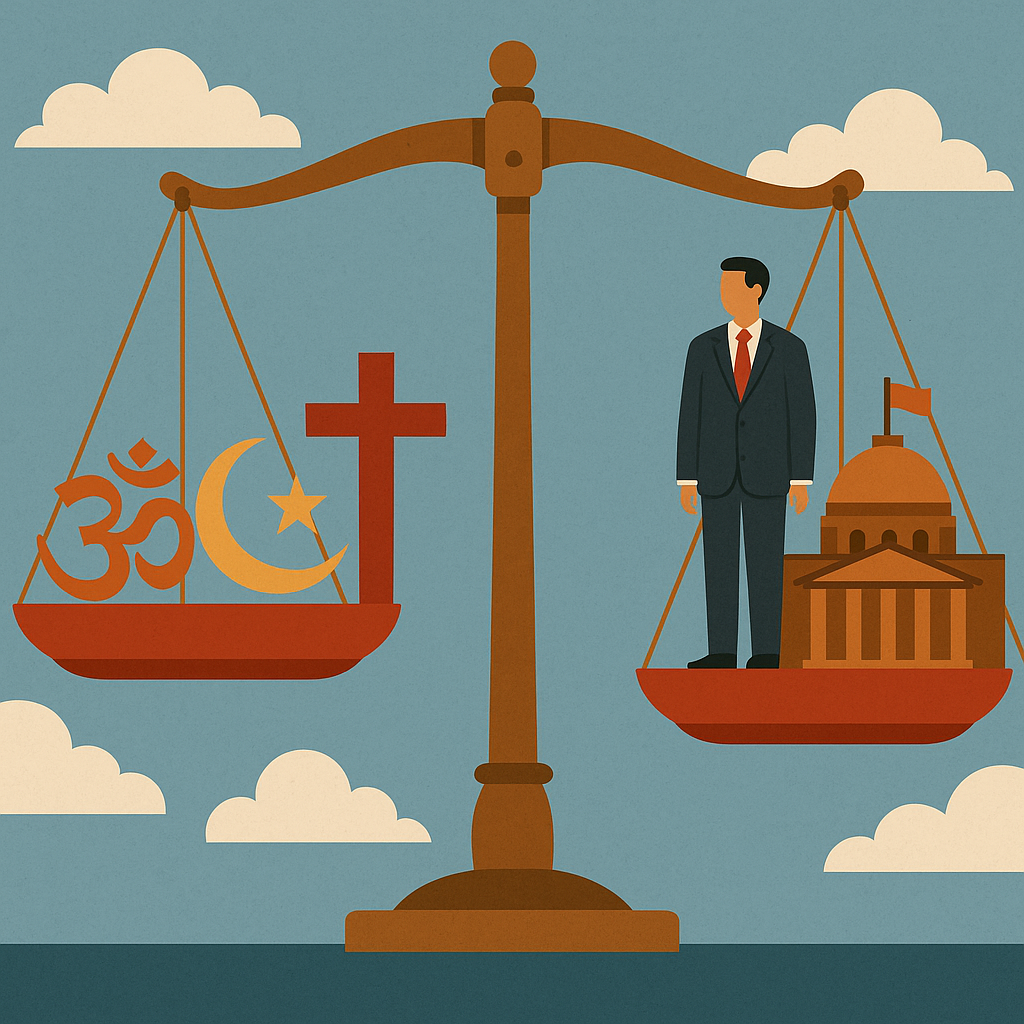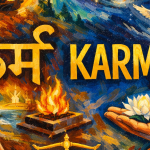Secularism’s New Shape: Where Religion Meets Public Policy in India
India’s secularism has always been a unique experiment—a model that doesn’t separate religion from the state entirely, but rather strives to maintain equal respect for all faiths. Unlike the Western notion of secularism, which emphasizes strict separation of church and state, India’s version is about coexistence, balance, and harmony. Yet, as society modernizes and political realities shift, this model is being reshaped. Today, secularism in India is not about the absence of religion from public life but about finding ways for religion and public policy to engage meaningfully without compromising democratic values.
The Indian Idea of Secularism
When India adopted its Constitution in 1950, it did not declare itself a “secular state” in the Western sense. Instead, secularism evolved as a practical framework to manage a deeply diverse society. The word “secular” was officially added to the Preamble in 1976 during the Emergency, but the spirit had long been embedded in the founding ideals—liberty of belief, equality before law, and freedom of worship.
Indian secularism thus does not demand the exclusion of religion from public affairs. It seeks to protect all religions equally while preventing any one faith from dominating the state. In practice, this means that government policies often interact with religious life—whether through personal laws, management of temples and charitable trusts, or recognition of minority educational institutions.
Changing Realities: Politics and Identity
In the 21st century, secularism in India is facing new tests. Religion has become a visible factor in political identity and public debate. Political parties often use religious imagery and rhetoric to connect with voters, while social media amplifies faith-based narratives. Critics worry that this trend blurs the line between faith and governance, threatening the delicate balance that secularism depends on.
Yet, others argue that religion cannot simply be removed from Indian public life—it must be engaged with constructively. For many citizens, religion remains a key part of moral and social identity. Rather than pretending religion doesn’t matter, modern secularism must find ways to ensure that public policy remains fair, inclusive, and grounded in constitutional principles—even when it interacts with faith.
Policy Meets Piety: Real-world Intersections
Religion influences numerous areas of Indian policy. For instance, personal laws—covering marriage, divorce, inheritance, and adoption—still vary across religious communities. The ongoing debate over a Uniform Civil Code (UCC) exemplifies this intersection. Supporters see it as a step toward equality and gender justice, while opponents fear it may erase cultural and religious diversity. The challenge for policymakers is to ensure that reform respects both rights and identities.
Another example lies in education policy. Many religious institutions run schools and universities that serve millions. The state often funds or regulates these institutions, balancing autonomy with accountability. Similarly, public holidays, pilgrim subsidies, and temple or waqf management often bring religion and governance into direct conversation.
Environmental and welfare programs are also increasingly engaging with faith. Campaigns for cleanliness, water conservation, or climate awareness now partner with religious leaders, recognizing their social influence. For example, temples and mosques are joining “green faith” movements by promoting eco-friendly rituals and solar-powered facilities. This blending of ethics and policy shows that religion, when harnessed responsibly, can serve the public good.
Judicial Role and the Limits of Secularism
The judiciary has played a vital role in interpreting and redefining India’s secular framework. Landmark rulings—such as the Shirur Mutt case (1954) and S.R. Bommai (1994)—clarified that secularism is a basic feature of the Constitution, and that the state must maintain principled distance from all religions. However, the courts have also intervened in religious matters, from regulating temple entry to banning practices like instant triple talaq, when fundamental rights were at stake.
This evolving judicial engagement reflects India’s version of “reform through secularism”—where faith practices are respected but cannot override constitutional morality. In essence, secularism is not a shield against religion but a bridge between faith and rights.
The New Face of Indian Secularism
Today, secularism is no longer just a legal doctrine—it’s a lived negotiation between tradition and modernity. Urban India is seeing the rise of interfaith initiatives, digital spirituality, and community service projects that transcend religion. Young Indians, especially, tend to be culturally rooted yet open-minded, seeking ethics without rigid dogma.
At the same time, public institutions are learning to be faith-sensitive but not faith-driven—acknowledging that religion influences citizens’ lives while ensuring that governance remains neutral. Universities host comparative religion studies, civic programs include interfaith dialogue, and policymakers increasingly consult faith-based organizations on issues like health, education, and gender equality.
This new secularism is pragmatic, inclusive, and participatory. It recognizes religion as part of India’s public consciousness but insists that no faith should dictate state policy. In short, it’s secularism shaped by pluralism rather than polarization.
Challenges Ahead
Despite these positive shifts, challenges remain. The politicization of religion can inflame divisions and erode trust in institutions. Hate speech, communal violence, and misinformation threaten the secular fabric that has held India together. Reasserting constitutional values requires consistent civic education, stronger media literacy, and leadership that prioritizes unity over identity politics.
Another challenge is ensuring that marginalized religious communities feel equally represented in policy-making. Secularism must evolve not only as a philosophy of governance but as a social ethic—one that empowers all citizens, regardless of belief, to participate fully in national life.
Faith, Freedom, and the Future
India’s secularism is not static—it is a living idea adapting to the times. In the decades ahead, its strength will lie in its flexibility: the ability to engage religion without being ruled by it. As public policy continues to intersect with faith—from temples to legislatures, from environmental action to gender rights—the goal should be balance, not exclusion.
In reimagining secularism for modern India, the state’s role is not to silence religion but to create space for all religions to coexist peacefully under the canopy of democracy. That evolving vision—where faith and freedom walk hand in hand—may well define the next chapter of India’s democratic journey.
~Religion World Bureau










